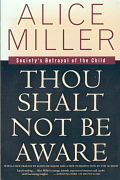Thou Shalt Not Be Aware
Farrar Straus Giroux, 1984
revised edition, 1998

Child abuse is beginning to be recognized as something more significant than an isolated family affair. The title of Alice Miller’s book, first published in Germany in 1981, spells out the unspoken commandment that such abused children – indeed, all of us – have been obeying since early childhood. We have all been made to feel from our earliest days that we are to blame for anything shameful that happens to us, so that our awareness of these inflicted abuses dims. Alice Miller demonstrates that this centuries-old tradition also finds expression in Freud’s notions of “the Oedipus complex” and “infantile sexuality” – his drive theory – which put the blame on the child. Freud maintained that his patients who claimed to have been sexually molested as children were only “fantasizing” as a defense against their own sexual desires for their innocent parents. This theory helped to conceal the fact that sexual abuse of children occurs frequently and results in later emotional disturbances in the victims of such abuse – because they are not allowed awareness of it. In fairy tales, works of literature, and dreams, Alice Miller maintains, the truth about childhood can emerge, precisely because it is not recognized as such. Detailed examples from Kafka, Flaubert, Beckett, and Virginia Woolf offer proof of her thesis and illustrate her understanding of human creativity.
- From Rage to Courage
- Free From Lies
- The Body Never Lies
- The Truth Will Set You Free
- Paths of Life – Seven Scenarios
- Breaking Down the Wall of Silence
- The Drama of the Gifted Child
- Banished Knowledge
- The Untouched Key
- Pictures of a Childhood
- Thou Shalt Not Be Aware
- For Your Own Good
- Prisoners of Childhood

